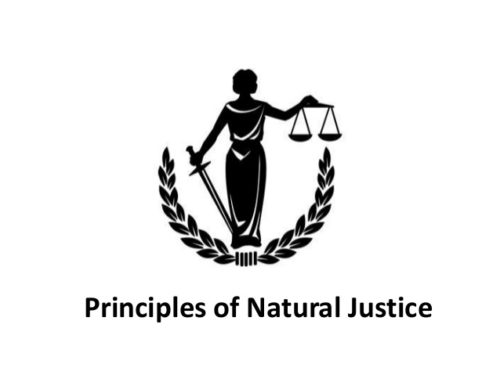Natural Justice: Fundamental Principles and Modern Applications
Introduction
Natural justice represents one of the most enduring legal concepts in jurisprudence, embodying fundamental fairness in legal proceedings. Derived from Roman law principles and developed extensively through English common law, these principles have evolved to become essential safeguards against arbitrary exercises of power in both judicial and administrative contexts.
Historical Development
The concept of natural justice traces its origins to ancient legal systems, with the Roman maxim audi alteram partem (hear the other side) representing one of its earliest articulations. However, it was through the development of English common law that natural justice principles gained coherent structure and application. The landmark case of Cooper v. Wandsworth Board of Works (1863) established that even where statutory procedures were silent on procedural requirements, decision-makers were bound by “the justice of the common law.”
The 20th century witnessed the expansion of natural justice principles from purely judicial settings to administrative tribunals and executive decision-making processes. Lord Reid’s judgment in Ridge v. Baldwin [1964] marked a pivotal moment, rejecting the notion that natural justice applied only to “judicial” decisions and extending its application to administrative actions affecting rights, interests, or legitimate expectations.
Core Principles
Natural justice is traditionally understood as encompassing two fundamental principles:
- Nemo Judex in Causa Sua (No One Should Be a Judge in Their Own Cause)
This principle embodies the requirement of impartiality and the absence of bias in decision-making. It prohibits individuals from adjudicating matters in which they have a personal interest or reasonable apprehension of prejudice. The test for determining bias has evolved from the stringent “real likelihood” standard to the more accessible “reasonable apprehension” test articulated in cases like Porter v. Magill [2002].
The prohibition against bias encompasses
- Financial or proprietary interests in the outcome of proceedings
- Personal relationships with parties involved in the case
- Attitudinal or ideological predispositions that preclude fair consideration
- Prior involvement in the matter that compromises neutrality
- Audi Alteram Partem (Hear the Other Side)
The right to a fair hearing constitutes the second pillar of natural justice. This principle ensures that individuals affected by a decision have adequate opportunity to present their case before judgment is rendered. The essential components of this principle include
- Notice: Affected parties must receive timely and adequate notification of proceedings against them, including sufficient detail of allegations or matters under consideration.
- Disclosure: Decision-makers must provide access to evidence or information being considered in reaching their determination.
- Opportunity to respond: Parties must have a meaningful chance to present their arguments and evidence.
- Right to representation: In many contexts, particularly where complex matters or significant interests are at stake, the right to legal representation is recognized.
- Reasoned decision: Decision-makers must provide reasons that demonstrate consideration of relevant submissions.
The case of Kioa v. West (1985) in Australia exemplifies the application of these principles, establishing that procedural fairness requires disclosure of “credible, relevant, and significant” information that could influence a decision.
Modern Applications
- Administrative Law
Natural justice principles have found their most expansive application in administrative law, where they serve as essential constraints on executive power. The growth of the administrative state has necessitated robust procedural safeguards against arbitrary or capricious decision-making by government officials and agencies.
- Disciplinary Proceedings
Professional disciplinary proceedings represent another significant domain for natural justice application. When professional bodies exercise their authority to regulate members’ conduct, they must adhere to fair procedures that respect natural justice principles.
The English Court of Appeal in a case emphasized that professional tribunals must ensure procedural fairness commensurate with the potential consequences for practitioners, particularly where career and reputation hang in the balance. This includes clear notification of charges, access to evidence, opportunity for representation, and impartial adjudication.
- Corporate Governance
Natural justice principles have increasingly penetrated private sector contexts, particularly in corporate governance. Expulsion from membership organizations, termination of employment, and shareholder disputes frequently invoke natural justice requirements, even in ostensibly private relationships.
The case of Russell v. Duke of Norfolk [1949] emphasized that the principles of natural justice are not universally applicable in a rigid manner but are contingent upon the specific circumstances of each case.
Contemporary Challenges and Developments
- Balancing Security and Procedural Rights
National security concerns have created tension with natural justice principles, particularly regarding the disclosure of sensitive information.
The development of “special advocate” systems, whereby security-cleared lawyers represent individuals in closed proceedings, represents an imperfect compromise that continues to challenge traditional natural justice conceptions.
- Digital Justice and Algorithmic Decision-Making
The integration of artificial intelligence and automated systems in administrative and judicial processes raises profound questions for natural justice principles. Algorithmic decision-making may obscure reasoning processes, complicate meaningful participation, and introduce systemic biases.
- Substantive Fairness
Contemporary jurisprudence has witnessed the gradual expansion of natural justice beyond purely procedural considerations toward substantive fairness. The traditional distinction between process and outcome has blurred, with courts increasingly willing to scrutinize the reasonableness of decisions themselves.
In Minister for Immigration and Citizenship v. Li (2013), the High Court of Australia recognized that unreasonableness in decision-making may constitute a jurisdictional error, suggesting that natural justice’s concerns extend beyond procedure to the substantive quality of decisions.
Conclusion
Natural justice principles continue to serve as essential safeguards against arbitrary power in contemporary legal systems. Their flexibility has enabled adaptation to diverse contexts, from traditional judicial proceedings to modern administrative determinations and even private governance arrangements. As legal systems confront new challenges—technological innovation, security imperatives, and increasingly complex regulatory frameworks—natural justice remains a vital touchstone for ensuring fair treatment of individuals affected by exercises of authority. The continued vitality of these ancient principles testifies to their fundamental connection to our conception of justice itself.
Contributed By: Hetu (Intern)

